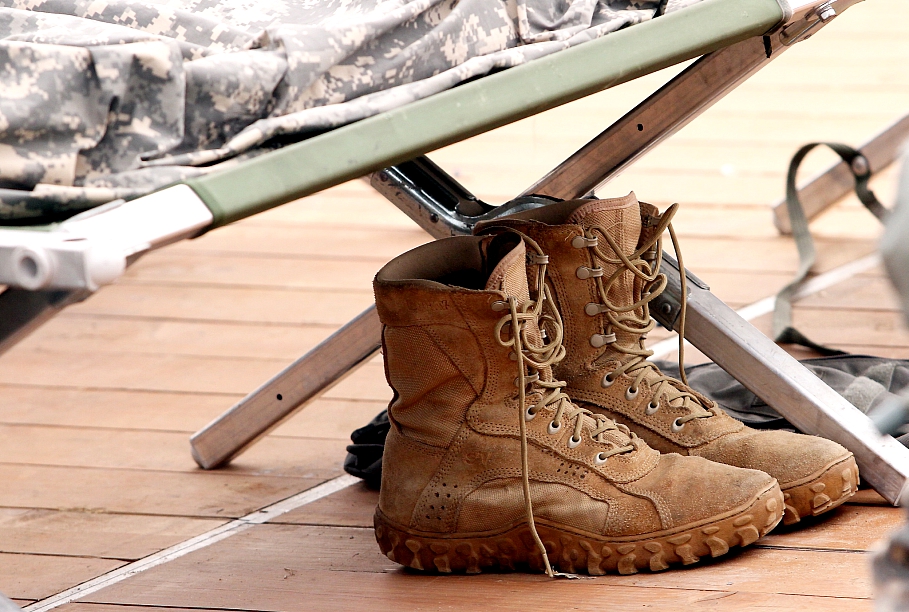It was supposed to be boogie time back then on April 2nd, 2004. The Baltic States had just become fully-fledged NATO members and to drive this point home a flyover of alliance jets over the three Baltic capitals was promised.
Crowds gathered on the banks of the Daugava and in the Old Town of Riga to listen to the sound of freedom and possibly to shoot a photo of a couple of Belgian F16s. But they never thundered that day.
The widely advertised event was canceled, and official explanations were absent initially and clumsy at best later. Then the main version appeared: a local newswire quoted a Defense Ministry official stating the overflight was called off for some unnamed technical reasons.
That evening Old Riga's pubs and other watering holes were full of foreign correspondents who arrived to cover the first ever expansion of the Euro-Atlantic community into former Soviet territory. Some of the locals (this writer included) joined them over beer and pretzels.
"Is it possible to dodge Article Five obligations for technical reasons as well?" was the joke of the day. Everybody heartily laughed, and foreign correspondents, who had already packed and had their return tickets ready, most heartily of all.
In a matter of days, with the foreign reporters already long departed, the real reasons for the aerial no-show became known. It was the British press who dug out that a phone call from Moscow was made to NATO HQ. Some advice was conveyed and heeded.
This long-forgotten incident popped up in this writer's memory over a recent coffee with a Western diplomat. Polite smalltalk drifted seamlessly on subjects ranging from local bookstores, the bloodletting in the Eastern Ukraine, the weather and the Facebook proclamation of the "People's Republic of Latgaliya".
You see, as long as an "external force" will maintain some degree of plausible deniability, the alliance will not consider a reprise of the Donbass uprising on NATO soil an Article Five event, much like it always treated Kurdish armed rebellion in Turkey as an internal affair, this writer was advised.
Of course, if tanks will roll over the border openly (with flags on their turrets waving and the anthem blasting via loudspeakers), the Alliance will honor its obligations swiftly, came the reassurance.
"They’re here and it’s over in four hours", Estonian president Toomas Hendrik Ilves described the worst-case scenario in typically pithy fashion recently.
Presidents, unlike ministers of defense and chiefs of intelligence services, are not obliged by a contract to be paranoid, even if they are occasionally of their own free will. But even if you are paranoid it does not mean that you are wrong raising the issue of time.
The only time in history that NATO invoked the clause of collective defense was following the 9/11 terrorist attacks on the United States. It took ambassadors (just 19 of them back then) 26 hours to convene for an urgent meeting and to press that button with number 5 on it.
Activation of Article Five resulted in adoption of the solemn declaration committing everyone to collective defense. The declaration, however, did not necessarily mean NATO would get involved in military action, The New York Times cited NATO's then secretary general Lord Robertson as saying.
The Times helpfully explained further, that "any decision to embark on joint military action would require further deliberation, as would a decision to place national forces under joint command".
It was exactly under joint command that Baltic soldiers got all types of accolades and kudos for their actions in international operations in some of the nastiest areas of Afghanistan and Iraq. And not from politicians only — people in uniform hold their Baltic colleagues in very high esteem indeed.
However, it appears that on their way to becoming excellent peacemakers or peace enforcers, the Baltic militaries lost something that is the single most essential thing for any army: the ability to hold their home territory, at least for longer than several hours.
The much-heralded NATO rapid reaction force now in the process of creation will not deploy automatically. Some political order must be given, and that means that the allied cavalry would arrive somewhat later than in four (or even twenty four) hours.
Baltic governments are trying hard to get some American, British or Norwegian boots on their ground. Smart of them: these soldiers would be willing hostages of a kind, military collateral to politically mortgaged collective defense. Collateral is insured and this would be the case here as well. A platoon, a company or even a regiment would not make much military difference, but if it found itself under hostile fire, the 'insurance policy' could be cashed much faster than Article Five's slow-motion machinery.
A government that sent an attacked unit would be forced to react really fast. When one of your own is in a harm's way, you usually have much less patience with the ambassadors hell-bent on polishing wording of their solemn proclamation.
Alas there are precious few free boots nowadays, and even fewer for the purpose of planting them on foreign soil: military budgets of the member states on average continue to shrink, Ukrainian crisis or no, and willingness to fight for an ally is shrinking even faster, if Pew Research is to be believed.
But don't despair — yet. There is a way out: to build decent housing, good roads, hospitals, shopping malls and multiplexes in the Baltics' border areas and to invite several thousand pensioners from the "old" NATO member states to settle there for free. Their governments will protect them whatever the cost, thus making both ambassadorial procrastination, the general public’s lack of affinity with remote allies and other factors irrelevant.
In the end of the day a couple of quarrelsome old ladies with their umbrellas unfolded might turn out to be a much more robust deterrent than any number of collective agreements.
































